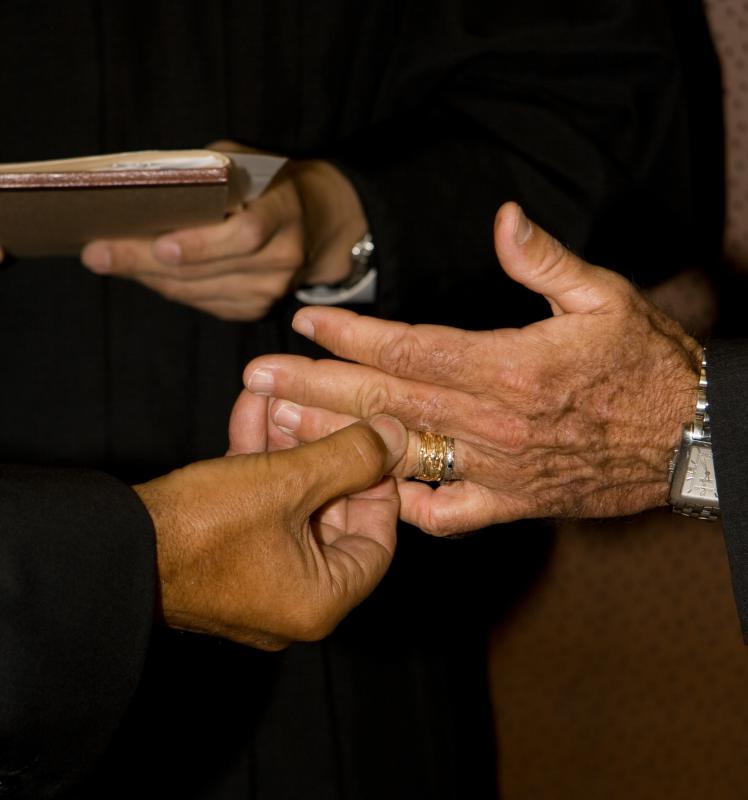At WiseGEEK, we're committed to delivering accurate, trustworthy information. Our expert-authored content is rigorously fact-checked and sourced from credible authorities. Discover how we uphold the highest standards in providing you with reliable knowledge.
How do I Become a Wedding Officiant?
There are many ways to become a wedding officiant, which allows people to legally perform marriages. Some paths are long ones, where having this legal right is not the main objective. There are other very easy methods, which may allow someone to perform a marriage at any time or within a specific time frame.
Many different professions have the legal right to perform marriages. People who are ordained ministers automatically become wedding officiants upon ordination. Pastors of churches, whether or not they’ve received ordination, usually can legally marry people. Justices of the Peace (JP), military chaplains, and ship’s captains can also officiate at weddings.

Some of these officiants study for a significant amount of time to obtain their professional status. Ordination rules for priests, ministers and rabbis may include long study. JPs usually have legal degrees, and it takes considerable experience to captain a ship. The ability to officiate at a wedding usually isn’t the end goal of these professions, but it may be an added benefit.

Some churches may have special rules that allow people other than priests or ministers to perform marriages. For instance, church deacons in many Christian sects, who may be ordained, may be able to perform marriages. When people would like to officiate at weddings under the guidance of a specific church, they can check with their church to see if this is possible.

The quick paths to become a wedding officiant are surprisingly easy. The first is to check with the local county clerk to see if the office grants permits for a person to officiate at a wedding. This would allow anyone who wishes to officiate at a specific wedding to get a single permit to perform a single marriage. This right is not granted in all areas.

Another way is to apply online for ordination. This can be free or relatively inexpensive, and it means the person can be titled a minister or any other title that he or she chooses. When individuals are considering this path, it’s important for them to make sure that the ordination is legal. Again, checking state or federal laws can help determine legal status to perform marriages.

There are many Internet sites that allow people to receive ordination and become wedding officiants. Many of them don’t require specific religious beliefs and don’t charge for their services. Usually, application is done online and takes a few days to complete. When people want to officiate at a wedding for friends, for instance, they should apply a few months in advance with a site that will give them the legal right to perform a marriage. This gives plenty of time for ordination to be completed.
AS FEATURED ON:
AS FEATURED ON:















Discussion Comments
Weddings in Ireland are of two types: civil and Religious. civil ceremonies are performed by HSE registrars and religious by priests/ministers, etc., all of whom must be registered with the general registrar's office. Online ordinations are not recognized as being valid.
Is this legal in Ireland?
I'm a church leader and have been asked if i could marry a couple. we are a nondenominational group. does the english uk laws require me to get a permit or special training to perform such a ceremony? I'm happy to join them in holy matrimony but I'm totally unsure if i can marry them legally due to my lack of knowledge of the uk english laws. any help or advice would be very much appreciated.
@ Chicada- I doubt that any laws would require that someone seek the services of a minister at their wedding. People are free to choose their religion; or whether they even want to follow a religion for that matter. If a person were told that a marriage was only legal if an ordained minister or church official performed their religion, then the state would be blurring the lines between religion and state. As the article stated, you can have almost anyone marry you as long as they register with their state.
@ Chicada- I am getting married next year and we are having non-denominational wedding officiate perform the ceremony. I am pretty sure that the officiate is a justice of the peace, which is more of a political title than a religious title. Neither my fiancée nor I are religious, so we thought it would be weird if we had an ordained minister perform our ceremony when we have rarely stepped foot in a church.
As far as I know, the person performing our religion has no professional religious affiliation. Our officiate is actually hired through our wedding planner, and we had the option to choose an ordained minister or a non-denominational officiate. I hope this helps.
When becoming a wedding officiant, is it necessary that a person adhere to a specific religion or set of beliefs? What if the couple to be wed is not religious, or is of a religion that is not recognized as a large national religion? How do nondenominational wedding officiants receive their training? Do laws actually require that a couple be married by an ordained minister or someone of a certain faith?
Post your comments